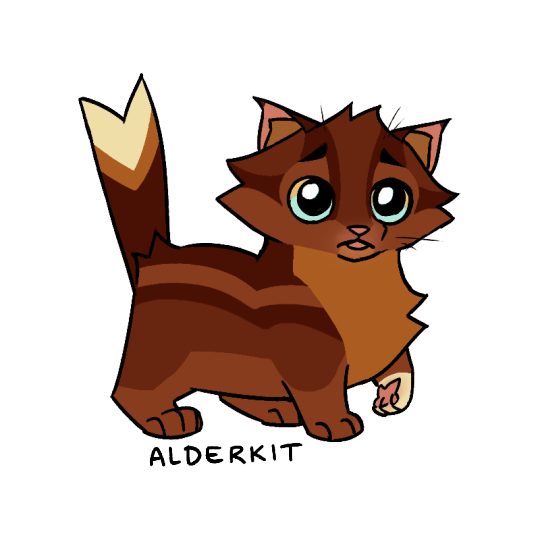hi i reblog a lot and post art once in a blue moonmostly bandori, revstar, and other stuff. 🇵🇭transmasc aroace lesbian (he/they/xer)
Don't wanna be here? Send us removal request.
Text



forgot to post this here too. bandori warrior cats doodles
19 notes
·
View notes
Text
Life or Death? ‼️

please stop I need your support to stand with my family in this bad situation ‼️
✅️Vetted by @gazavetters , my number verified on the list is ( #523 )✅️
✅️Vetted by @90-ghost



We don't even know anymore. Khaled, my little one, has started pronouncing the word "bombing," and it terrifies me.
I'm Jehad a father of two kids and lost everything because of war here in Gaza. I am now trying to rebuild some of it. With your kidness everything comes true ❤️❤️
We need to raise total of $100,000. Every dollar you contribute will make a tangible difference in our lives.
Please do your best to save my family and students we are waiting for your support. ❤️🙏
I’m not here to beg or list every detail—because even an entire newspaper wouldn’t be enough. The images on TV screens and the stories you see online already tell you so much about what we endure. But no matter how much you see, you’ll never truly feel what we feel. And I wouldn’t wish this life on anyone.
We are victims of conflicts we never chose. We love life—deeply, desperately—as long as we’re allowed to live it. We don’t want war, we don’t want destruction. All we want is a future. A future for ourselves, for our children—a future like every other human being deserves.






Everything is expensive and I need support follow you guys 🙏🙏❤️❤
Every dollar you contribute will make a tangible difference in our lives. Your donations can ensure that this newborn baby has a chance at survival and that can provide my children with the necessities they deserve.
How You Can Help
In this moment of despair, I reach out to you—not just as a stranger, but as a fellow human being. Our humanity connects us, and compassion knows no boundaries. Your kindness, no matter how small, can bring a glimmer of hope to our lives, shattered by war.
Our baby has been sick countless times, and every evacuation has only made things worse. We need help to survive, to heal, and to dream of a better tomorrow.
Even a Little Means Everything
We appreciate your help, even if it’s just a small donation or simply sharing our story. Every bit of support matters. Together, we can rebuild what’s been taken from us and find hope amidst the rubble.
Thank you, from the bottom of our hearts.
Jehad ❤️
3K notes
·
View notes
Text
old drawing i did aeound avemuji ~ep 2 when i was still optimistic for them 😭 merry bad ending.


70 notes
·
View notes
Text






my enas so far. + yumeship because i have free will yea yea yea
176 notes
·
View notes
Text
Fatima Al-Anqar is 57 years old, a mother of four and a grandmother of six. She suffers from heart problems, and has to take medication (Concor) to help with her heartbeat. However, this medication is expensive in Gaza and hard to come by. Genocide is hard on anyone—but for Fatima, taking care of her family has become increasingly difficult as the war takes its toll on her at-risk heart and body.

Please donate to the Al-Anqar campaign and share this post to get Fatima the medication and care she needs to continue to provide for her family!!!! If this ceasefire goes through, she and her family will still need your help, Gaza is in ruins and who knows if Israel will allow aid to reach people. SHARE AND DONATE!!!
€11,146/€20,000!!!
The Al-Anqar campaign is verified by GazaVetters, at #6 on their list.
@omegaversereloaded @punkitt-is-here @tamamita @skunkes @ot3 @valtsv @wolfertinger666 @paper-mario-wiki @nyancrimew @spongebobssquarepants @sabertoothwalrus @90-ghost @komsomolka @sawasawako @wolf-aid @hotvampireadjacent @necromancelena @certifiedsexed @isuggestforcefem @3000s @chokulit @ankle-beez @pitbolshevik @pissvortex @prisonhannibal @apas-95 @neechees @memingursa @afro-elf @vampiricvenus @turtletoria @marxism-transgenderism @beetledrink @bevsi @beserkerjewel @feluka @i-am-a-fish @spacebeyonce @b0nkcreat @11thsense @grox @aflo @slimetony @boobieteriat
@iregularlyevadetaxes
1K notes
·
View notes
Text
Forget about torturing your blorbos, putting them through the wringer. I'm putting my blorbo in perfectly ordinary, pleasant situations. Their tortured personality will cause them anguish anyway, making an absolutely mundane scene into the most dramatic, agony filled affair as though the world is ending and it's all their fault
78K notes
·
View notes
Text
ITS APRIL 13 YOU KNOW WHAT THAT MEANS
FETCH ME NEIL
393K notes
·
View notes
Text
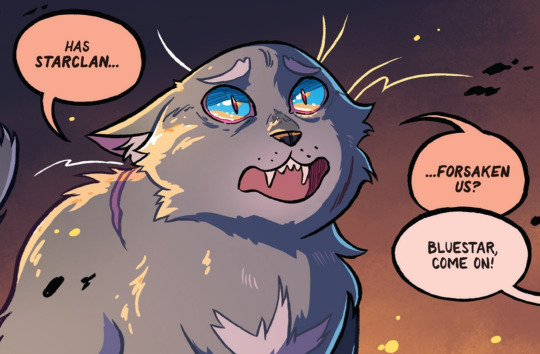
what makes bluestar so compelling is how often her fairness is often turned against her. she helps drive out brokenstar from shadowclan and bring back windclan only to have them team up to attack her, she spares brokenstar's life and he teams up with tigerclaw to attack them, she continuously gives tigerclaw the benefit of the doubt and he betrays her. her devotion to her own notions of fairness and justice, notions that often contradict what clan culture says one should be, continuously blow up in her face. she was told she was going to blaze through the forest like fire and now this is all she can see.
3K notes
·
View notes
Text

u u wa wa uwa
#bandori#morfonica#rui yashio#mashiro kurata#touko kirigaya#nanami hiromachi#tsukushi futaba#been seeing chiikawa a lot recently
29 notes
·
View notes
Text

shadowsight rendering practice. thing.
97 notes
·
View notes
Text
🌍✨ A Voice from Gaza: Fighting for Hope ❤️🩹
Hi, my name is Mosab , and I’m from Gaza. Life here has been harder than I could ever imagine, but today I’m sharing my story with hope in my heart, because your kindness has already given us so much strength.
This journey hasn’t been easy. The war has taken 25 family members from us—25 beautiful souls we loved deeply. Their laughter, their presence, their love… all of it is gone, leaving behind memories that are both precious and painful. Every day, I carry the weight of their loss, but I also carry their spirit, which gives me the strength to keep going.
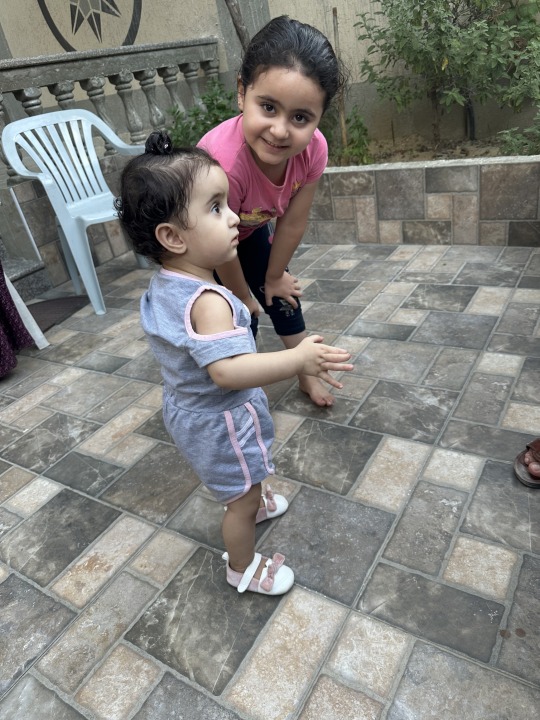
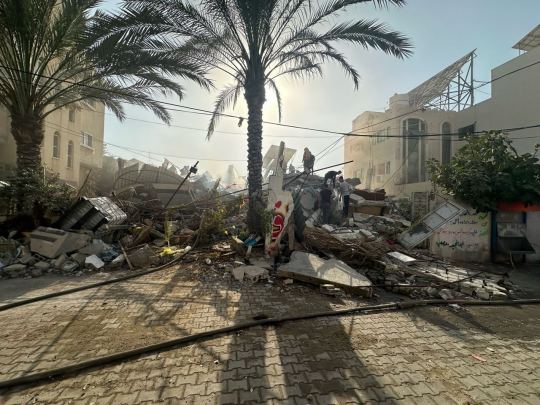
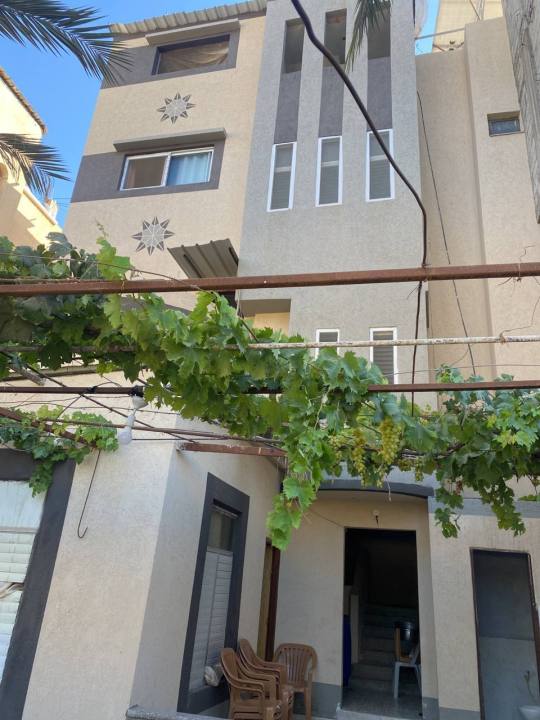
Our Journey So Far
When I first reached out, I couldn’t have imagined we’d make it this far. Your support has been a light in these difficult times, and we are so deeply grateful for every single contribution.
But the road ahead is still challenging. Every day, we’re reminded of how much we’ve lost and how much we still need to rebuild.
Here’s what life in Gaza looks like for my family right now:
🏠 Safety: The uncertainty of tomorrow weighs heavily on us.
😢 Loss: The absence of the 25 family members we’ve lost is a pain we carry every moment.
💔 Dreams on Hold: The future feels so far away when survival takes all our strength.
How You Can Help Us Cross the Finish Line Even the smallest act of kindness can make a difference:
$5 may seem small, but for us, it’s a little relief, a moment of comfort, and a reminder that kindness still exists. ❤️
Can’t donate? Reblog this post to help us reach someone who can. Every share matters more than you know.
✅️ Vetted by @gazavetters ( #309 ) ✅️
Why Your Support Matters Your kindness isn’t just about helping us meet our goal—it’s about reminding us that we’re not alone in this fight. It’s about hope. It’s about survival. And it’s about giving my family a chance to rebuild our lives, even in the face of unimaginable loss.
Thank you for helping us get this far. Your generosity and compassion have already brought us closer to a better tomorrow, and for that, I’m endlessly grateful.
With all my love and gratitude,
Mosab and Family ❤️
65K notes
·
View notes
Text
Visual Symbolism in Ave Mujica 12
One of the strengths in Ave Mujica is how well the visuals complement the story being told. The fact that animation necessarily conveys part of its story through visual means seems like an obvious statement, but some productions are definitely better at it than others. If you're interested in learning about cinematography, the theatricality of Ave Mujica makes it a pretty decent starting point. It is never particularly subtle, as every narrative beat is accompanied by a strong visual device to emphasize it. The scene composition, the objects in it, and the lighting and coloring are deliberately chosen to complement mood reversals, the relationships between characters, or even consciously reference the narrative's literary inspirations. The clear intentionality in the production team's visual staging are really instructional in how these choices work to complement stories in general. I'll share a few neat examples below the break for spoiler containment.
The episode's opening scene is a wonderful illustration of how the production team handles the visual pacing for a narrative beat, and I'll talk about it here because it also sets the wider theme for the episode, which I'll come back to in a bit. Sakiko is about to be carted off to Switzerland on her grandfather's orders. The sheltered but smothering environment her grandfather has created for her are conveyed by the desaturated tones of the scene and the claustrophobic framing of the shots. She is protected from a storm, at the cost of her personal freedom. At the same time, she muses whether this is the fate that God has chosen for her.
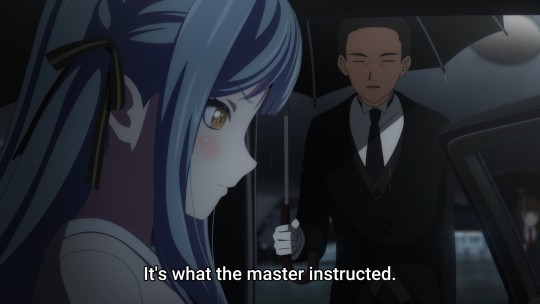
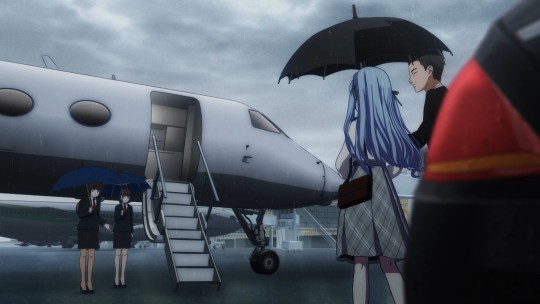
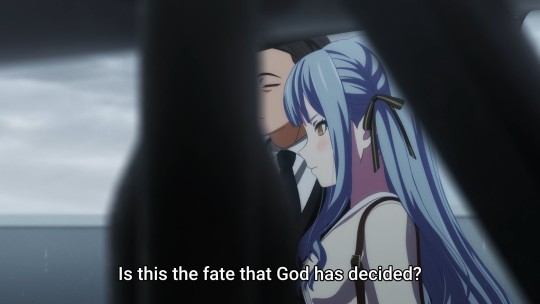
When Sakiko makes it to the airplane stairs, we arrive at the narrative decision point of the scene. She can either submit to her grandfather's orders by boarding, or she can reject the fate that has been decided for her. She hesitates, musing "I'm always like this. No matter how much I struggle, no matter how much I fight, everything gets swept away by the raging current." Each step to remain sheltered, to remain controlled, are a reminder of the unhappiness that following her grandfather's instructions have created.
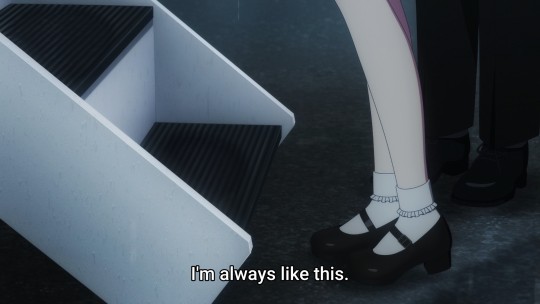
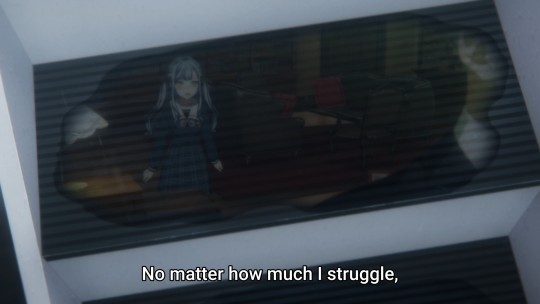
The scene's climax is reached when Sakiko makes the decision to reject her grandfather. Sakiko says, "I'm not getting on board." There is a short shot where she reaches her decision, a slightly longer shot of her hands clasped as if in prayer to find the resolve to follow through. There is a shot of an airplane flying away, symbolizing a departure without her, followed by the turbine wash blowing the umbrella out of her butler's hands. The sequence functions as a moment of divine providence. It answers the question posed as the decision point: a decisive no. Sakiko turns and runs before we cut to the series ending theme.
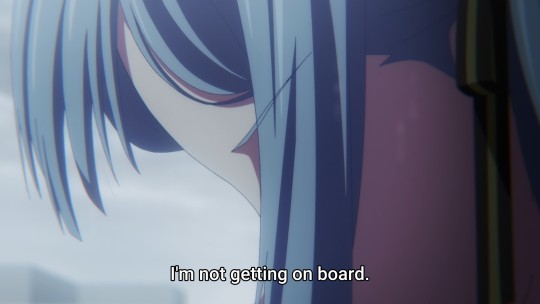
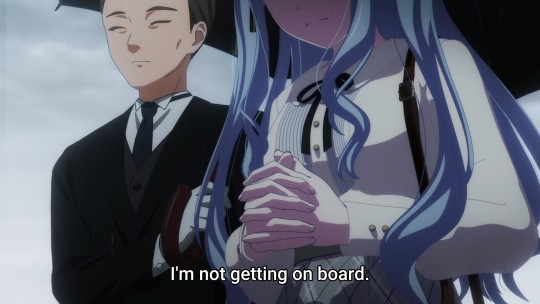

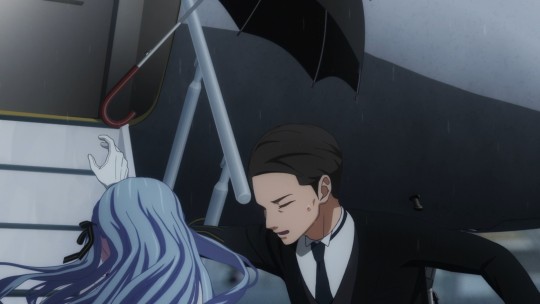
The decision to swap the running position of the ending and opening themes is itself an interesting narrative choice. Lyrically, the song is written from Uika's point of view, with a pastoral verse expressing a desire for Sakiko to come to her and goth metal chorus demanding a tight, everlasting bond between the two. The verse section is marked by visually spare images symbolizing the cast's loneliness, the bridge to the chorus accompanied by images of a mansion being demolished by flames, and the chorus conveying the various ways the cast feels trapped. Notably, the last shots are Uika reaching towards the light, a hand grabbing a sheet made into a rope, and then the Ave Mujica stage. Its placement at the beginning of the episode complements Sakiko's decision: she is irreversibly burning down the world her grandfather created to follow through with her lifetime commitment to the members of Ave Mujica.
That imagery neatly cues up the next part of the episode, which establishes a bond between Hatsune/Uika and Sakiko. I won't go into as much detail here, but there are a few neat things this segment does with visual metaphor, framing, and color that I would like to talk about.
There is some really neat visual symbolism in the rose garden scene where Sakiko first encounters Hatsune. This setting is established as Hatsune's world, so it reflects her landscape. Sakiko's appearance poses them on opposite sides of the frame, and this division is mirrored by the colors of roses present. Hanakotoba, the Japanese language of flowers, is a useful key to this frame composition: red roses symbolize love, pink roses symbolize trust/confidence/happiness, and yellow roses symbolize jealousy. Hatsune's decision to leave Tokyo and give up on Sakiko is symbolized by her trimming the red roses from the trellis, and the pink roses that surround her could be interpreted as something like self-confidence in her decision to do so. The mix of all three colors on Sakiko's side of the frame represent the turbulent whirl of jealousy, trust, and affection Hatsune feels towards Sakiko.
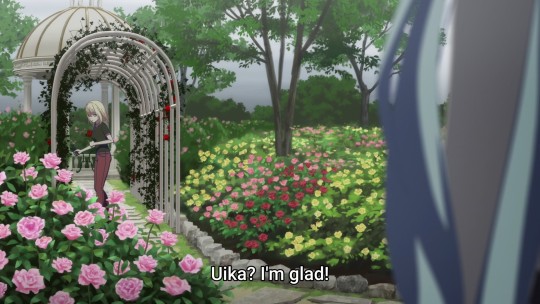
When Sakiko announces herself, she first calls for "Uika", causing Hatsune to drop the roses and begin running. It is the invocation of her "true name", Hatsune, that brings her to a halt. This is the moment where she, like Sakiko at the airport, needs to commit to her decision. Here, the framing emphasizes Sakiko's pull on her. A single, prominent red rose at her shoulder visually outweighs the pink roses behind her. The trellis of red roses, her love, shrinks into the background to converge on Sakiko, the villa, and the yellow roses. To stack the cards in her favor, Sakiko begins picking up the dropped roses, and holds them in a way that symbolizes she has received Hatsune's love. When Hatsune says that they shouldn't be together, Sakiko firmly commits by saying, "I'm not going back". The final shot conveys Hatsune, almost free of her love, with multiple paths ahead of her in a slightly less colorful world. Behind her, there is only one path leading to Sakiko and the Togawa villa, brighter, more well-tended... and deterministic.
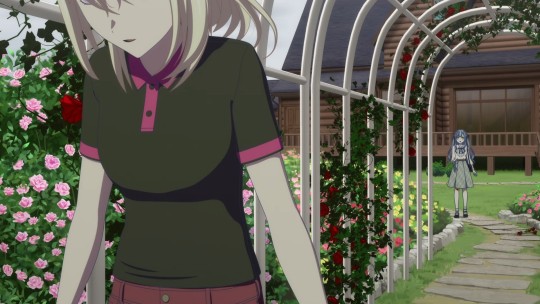
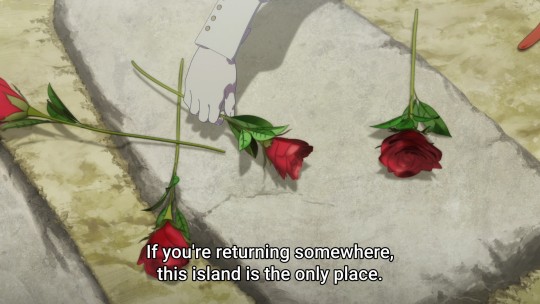
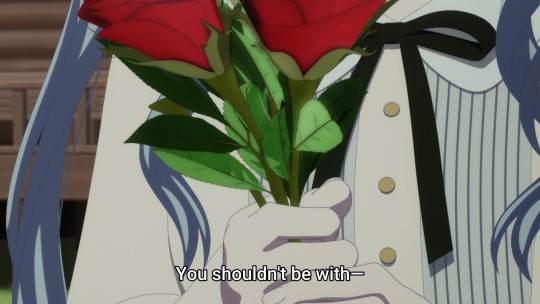
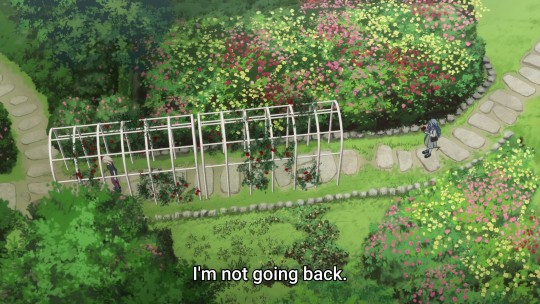
Although Sakiko manages to pull Hatsune back into her orbit, the ensuing conversations still have an underlying sense of tension to them. Hatsune and Sakiko are never shown directly looking at one another. The framing of these scenes use a variety of head-on close ups, shot/reverse-shots with the back of one character's head, low-angle shots at hip level, or wide shots that show them from a distance. The production team does everything but show the characters making eye contact while talking, intentionally creating a sense that they're talking at one another, not to one another. This decision also makes perfect sense in context: Sakiko is refusing to accept Hatsune's feelings of guilt and unworthiness, and Hatsune refuses to accept Sakiko's offer of forgiveness. This approach drags on so long - nearly ten minutes of runtime - that it begins to feel a little uncanny.
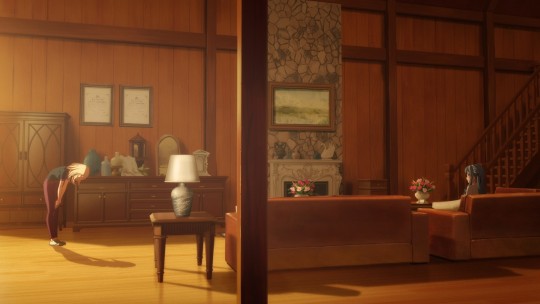
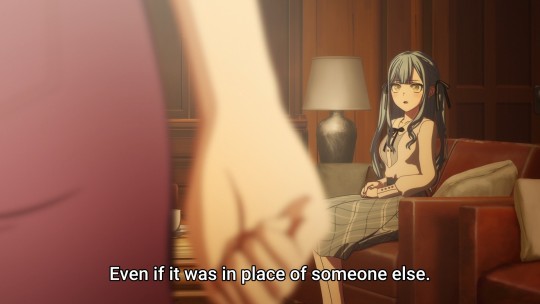
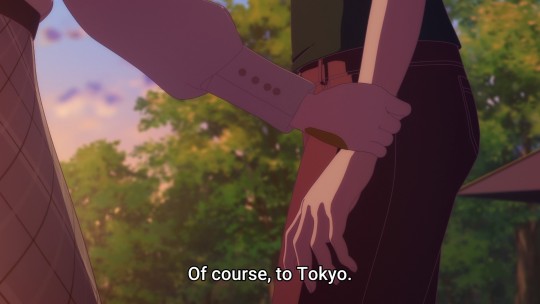
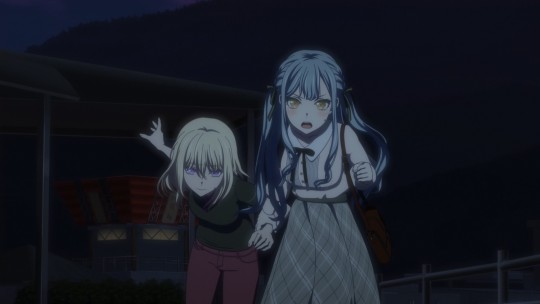
This tension continues to escalate until it's suddenly broken by the words Hatsune has desperately wanted to hear the whole time: "Our destinies are one. Didn't you give me your life?" After this point, the framing emphasizes their reactions to one another.
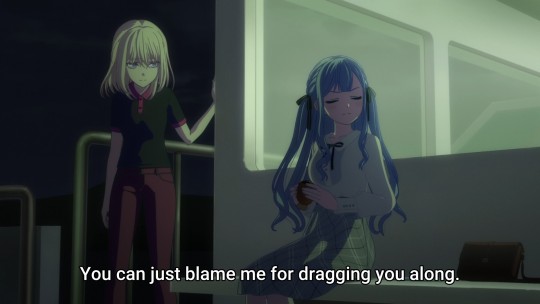
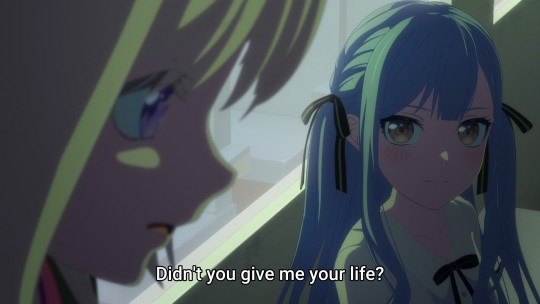
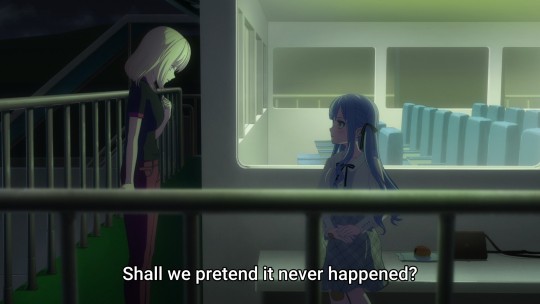
The unease created by the framing is emphasized further by the use of color in this episode. When they're shown together, the colors come across as slightly off - dark and muddy, even sickly. Before Hatsune accepts Sakiko's offer, the color choices are intense but desaturated. The color choices in these scenes might be conveying a sense of the darkness that Hatsune feels about her deception. After Sakiko makes the final decisive break with her grandfather to embrace "happiness" with Uika/Hatsune, there's a pale greenish tint to some scenes and an unnatural warmth to others. It suggests that there's still not something not quite right with their relationship.
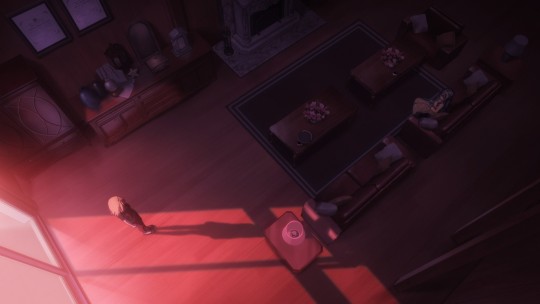
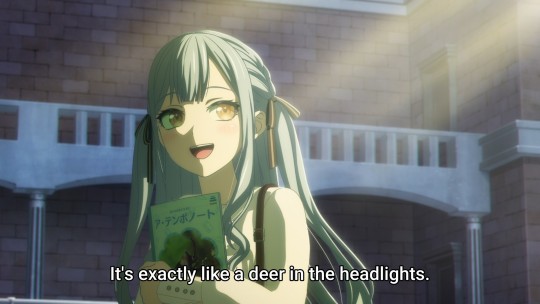
I think the sickly lighting in the "happy" section loops back around to the central narrative theme of the episode, which constructs the idea that Sakiko is playing God. Her rejection of the fate God - her grandfather - decided on is echoed at the end with her declaration, "I have come to realize there is no need to meekly accept fate. There is no God. So, I will become God myself." There are little messianic overtones throughout the episode, like the shot of her bandaged feet to emphasize her suffering, the extended sequence of her accepting Hatsune's "sin" of betrayal (Uika even referring to herself as Judas in the lyrics of KiLLKiSS), and the direct references to resurrection in her script for the new Ave Mujica show. She has decided to become the master of her own fate, and in so doing, the fate of Ave Mujica's members.
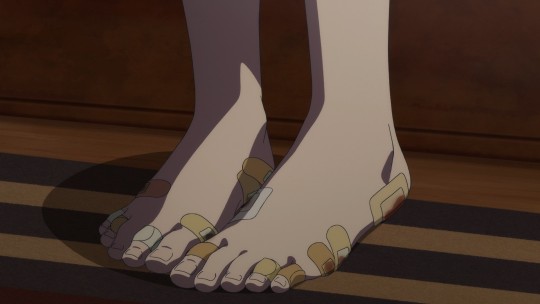
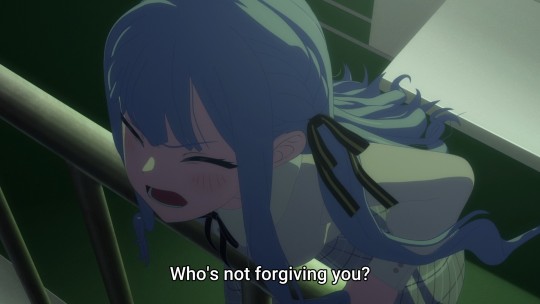
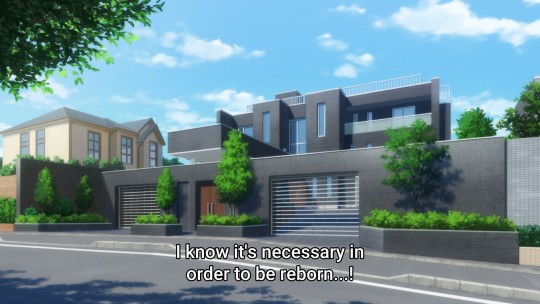
Ave Mujica consciously styles itself after Gothic literature. Within that literary framework, the decision to play God often marks the start of a terminal descent into madness. This descent into madness is often accompanied by the narrative point where the protagonist accepts the tragedy of their fate, surrendering their happiness to the inevitability of their own hubris. The letter Sakiko writes to Tomori at the end of the episode has an air of finality to it, echoing the Gothic protagonist severing the relationship to the one they truly desire. Sakiko's Faustian bargain for the lives of the Ave Mujica crew is the hubris she invited, her fate is to nurture them in perpetuity at the cost of her own happiness, as hinted by the lines in the script Nyamu is reading.
Again, the staging drives some of these points home. The first hint that something is awry is where Uika and Sakiko are laying together in Uika's loft. Their moment together is first interrupted by Umiri bringing band business to their attention. Her text comes at the exact moment the background music shifts to its outro. As Uika gets up to make coffee, she tells Sakiko she loves her, at which point the music cuts out completely. Although we see Uika's earnest intentions conveyed through her face, Sakiko's internal dialogue is telling. She stares up at the ceiling and says "Even if I turn away from fate, from the world, nothing will change. This little world will eventually come to an end, like waking up from a dream in the morning. Suddenly, and without warning." The camera then cuts to the pair of coffee mugs, established earlier in the series of symbolic of their relationship, as Sakiko says, "This smell, I hate it."
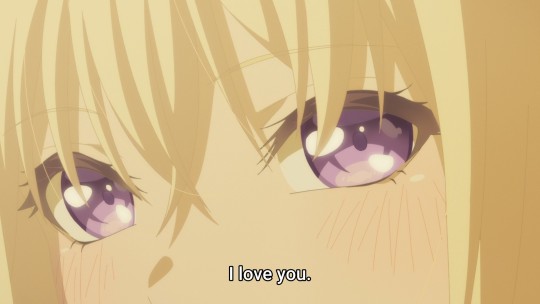
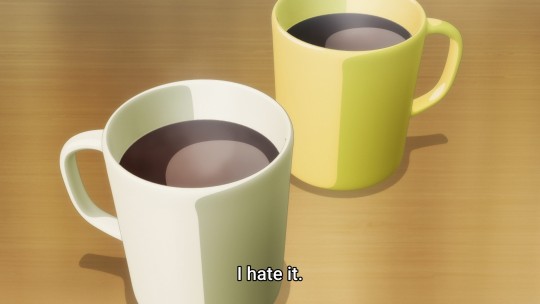
There is also a wonderful pair of mirrored shots in this episode, one of Sakiko playing in the Togawa garden with Uika, the other with her looking out the window as she praises Tomori's strength. The first shot symbolizes Sakiko's connections to her mother (the doll and piano) while showing the two splashing water on one another behind multiple barriers (the window, the garden fence). The second shot shows Sakiko looking outside wistfully from the piano, and placing her on the other side of the barrier from Uika. She closes her letter to Tomori with, "I may not be able to do it like you do, but I will protect my band in my own way."

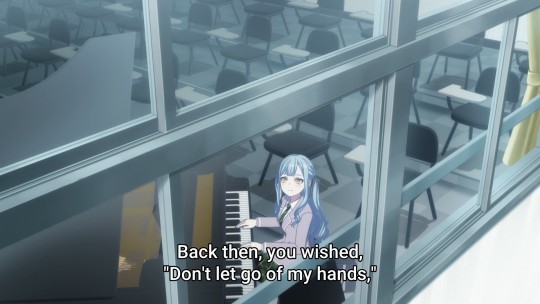
Taken as a whole - the unnatural coloration of their scenes together, the coffee monologue, and this paired shot function to highlight Sakiko's position as a Gothic protagonist. Her romantic overtures towards Uika are less a matter of her true feelings (which seem directed at Tomori) than they are a necessity to uphold her end of the bargain for Ave Mujica. Sakiko is performing a necessary act to coax Uika into a cage to keep watch over her fate as a member of Ave Mujica. The artifice of Sakiko's relationship with Uika doesn't make it any less real, but it does make it clear that it is not the fate she would have chosen for herself.
I honestly have no idea how to wrap this all up. Maybe one last point, not related to the visual presentation but tying the narrative points of playing God and tragic fate together, is the Gothic concept of corrupting blood. Hatsune's monologue in episode 11 suggests that the power of the Togawa family is matrilineal, as Sakiko's father and grandfather are both "adopted" into the family by marriage. This stages both the act of playing God (the power of a Togawa to force the creation of Ave Mujica) and the tragic fate that follows from that power. Her rejection of her grandfather is accompanied by the statement that he's the only one of them scared of the Togawa family. This makes sense, as her grandfather's position within the family can be jeopardized, but Sakiko's position as the true heir cannot. Her embrace of her bloodline and its corrupting influence comes at the end of the episode, when she reminds her old manager who she is: "Oblivionis of Ave Mujica - Togawa Sakiko". She off the carrot of the lead member of a top-selling stage act, but doesn't hesitate to show the stick of old money connections and power.
Sakiko's challenge to her ex-manager leads neatly into placing the opening theme at the end of the episode. Its placement symbolizes the permanent return to the managed madness of Ave Mujica's stage act, its members trapped in a funhouse mirror of their own identity constructed through Sakiko's manipulations.
153 notes
·
View notes
Text
[bandori wcats au]
pureflutter, cw for blood



(mashiro)
7 notes
·
View notes




